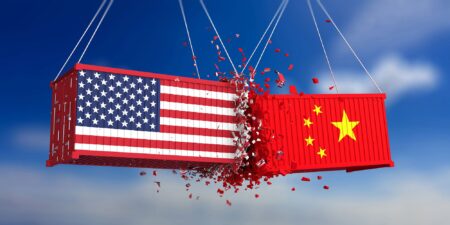By Ryan Hanrahan
Reuters Lisa Baertlein reported Wednesday that “the union representing 45,000 dock workers on the U.S. East and Gulf Coasts and their employers on Wednesday said they reached a tentative deal on a new six-year contract, averting further strikes that could have snarled supply chains and taken a toll on the U.S. economy.”
“The International Longshoremen’s Association (ILA) and the United States Maritime Alliance (USMX) employer group, in a joint statement, called the agreement a ‘win-win.’ The deal includes a resolution in automation, which had been the thorniest issue on the table,” Baertlein reported. “‘This agreement protects current ILA jobs and establishes a framework for implementing technologies that will create more jobs while modernizing East and Gulf coast ports – making them safer and more efficient, and creating the capacity they need to keep our supply chains strong,’ the groups said.”
“Terms of the deal were not disclosed,” Baertlein reported. “ILA and USMX have agreed to continue operating under the current contract until the contract is ratified.”
“Shipping industry executives, customers and analysts had been concerned that the parties would be unable to overcome their impasse, leading to a second ILA strike just days before President-elect Donald Trump’s Jan. 20 inauguration,” Baertlein reported. “A three-day ILA strike in October had triggered a surge in shipping prices and cargo backlogs at the 36 affected ports. Longshoremen returned to work after employers agreed to a 62% wage increase over the next six years.”
Union Credits President-Elect Trump
Politico’s Ry Rivard, Sam Ogozalek and Nick Niedzwiadek reported that “the head of the dockworkers union, Harold Daggett, heaped praise on Trump for helping smooth the way for a deal, saying Trump — who had criticized industry’s automation plans — ‘gets full credit.’ He cited the president-elect’s public support for the labor group after a meeting late last year.”
“‘President Trump’s bold stance helped prevent a second coast wide strike at ports from Maine to Texas,’ Daggett, the head of the International Longshoremen’s Association, said in the separate union statement on Facebook,” according to Rivard, Ogozalek and Niedzwiadek’s reporting. “The union’s statement, which did not mention President Joe Biden, serves as a last-minute embarrassment for the outgoing Democrat, who repeatedly called himself labor’s best friend. It’s also a significant victory for Trump, who has been attempting to shear rank and file union support away from Democrats for months.”
“Trump sided with the dockworkers in a Truth Social post last month, saying he had met with Daggett and his son, Dennis, the union’s executive vice president,” Rivard, Ogozalek and Niedzwiadek reported. “The incoming president argued that, when it comes to automation, ‘the amount of money saved is nowhere near the distress, hurt, and harm it causes for American Workers, in this case, our Longshoremen.’”
Strike Could Have Affected Ag Shipping
In the run up to the first port strike in October, AgWeb’s Jim Wiesemeyer reported that “a potential dock workers’ strike Oct. 1 on the East Coast and Gulf Coast would not significantly impact grain export facilities.”
“The strike would have limited impact on bulk grain exports, including corn and soybeans. Bulk grain export facilities would not be affected by the strike as these facilities typically operate with different labor arrangements, such as their own employees or different labor unions,” Wiesemeyer reported. “…While bulk grain exports would be largely unaffected, the strike would impact containerized agricultural exports: Soybeans, soybean meal, and other agricultural products exported via containers would be affected.
“While grain export facilities may not be directly impacted, there could be indirect effects on grain producers: The strike would significantly impact exports of chilled or frozen meat, eggs, and other livestock products, which are primarily shipped in containers,” Wiesemeyer reported. “Any harm to the U.S. livestock industry would indirectly affect soybean and grain farmers, as these industries are interconnected. East and Gulf Coast ports accounted for 44% of U.S. waterborne pork exports and 29% of waterborne beef exports in the first half of (2024). New York/New Jersey, Wilmington and Charleston were the largest East/Gulf ports for pork exports and Houston was largest for beef.”
Deal Reached to Avert Second East, Gulf Coast Port Strike was originally published by Farmdoc.


:max_bytes(150000):strip_icc()/WheatField-CloseUp-2000-bc79406da4004a2d94bcb2c32153cc3a.jpg)



:max_bytes(150000):strip_icc()/04-06-2023-VIG-Aerial-1-1024x687-75f70921ba05423f9c306c9a550a9935.jpg)
:max_bytes(150000):strip_icc()/DanyelleHeadshot-c182f009a01e4dca8b6d92ec8c0c5d3c.jpg)
:max_bytes(150000):strip_icc()/wheat-money-close-up-a30e27225d8e4578bbb92ccd8450f201.jpg)
:max_bytes(150000):strip_icc()/Xtreme-Ag-Early-Soybeans-Panel-Commodity-Classic-23684ddb70384ae99c4c77e4e744a581.jpg)
